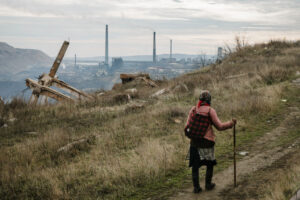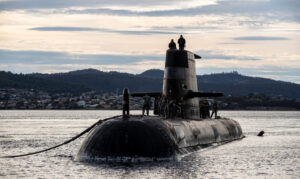The timing of President Xi Jinping’s visit to Belgrade yesterday was far from accidental: exactly 25 years before, Nato forces bombed the city’s Chinese embassy during Operation Allied Force, the two-and-half month campaign against what was then the Federal Republic of Yugoslavia.
Given the Nato campaign was justified by the need to halt what was described as a Serbian “genocide” against ethnic Albanians in Kosovo, the circumstances surrounding the bombing, which left three Chinese journalists dead, remain murky. While Nato insists the attack was accidental, Beijing’s claim that it was deliberate was bolstered by a subsequent investigation in The Observer, which suggested the building was targeted by the US in order to foil Chinese intelligence-gathering efforts on American tactics and weaponry — allegations denied by Washington.
Yet if the circumstances of the bombing remain contested, the international consequences of Nato’s campaign against Serbia are clearer, as indeed is the difference between the China of 1999 and the China of today. There is, in short, no doubting the symbolism of Xi’s visit to the Balkan back-yard of the European Union.
A quarter of a century ago, although China was already the world’s second largest economy, measured by purchasing power parity (PPP) terms, its options for retaliation against the US bombing of its sovereign territory were limited. Today, not only is China the largest economy in the world — it is orders of magnitude more powerful in military terms, with significantly more means of exerting strategic, diplomatic and military pressure on the US and its allies, ranging across Africa to the South China Sea to the Taiwan Straits. On the site of the embassy now stands a new complex, incorporating a Confucius Institute as well as offices, workshops and a hotel. It is a symbol of China’s wealth and soft power as much as its world position. Perhaps even more significant than enhanced Chinese power, however, are the changes in the wider international order.
The Nato bombing over Kosovo was both the moment of peak liberal international hubris, and the moment the so-called “rules-based order” began to crumble. On the one hand, the campaign was justified by the need to defend the human rights of Kosovo’s majority Albanian population from a counter-insurgency campaign against Albanian separatists waged by Belgrade. On the other, the Nato bombing was also in explicit violation of the UN Charter, whose articles protected member-states’ sovereign rights to be free from external interference.
Unlike previous humanitarian military operations during the Nineties, in this case the circle was not squared by the UN granting authorisation for the Nato military intervention. The UN could not offer its imprimatur because of the threatened use of veto by Russia and China, permanent members on the UN Security Council. Both countries were suspicious of Western states’ growing proclivity to use force in defence of human rights, and both had good reason to want to discourage their own restive peripheral minorities from seeking outside military support.
Despite the lack of UN legitimacy, the pressure of the Nato bombing campaign, as well as behind-the-scenes Russian diplomacy, eventually forced the Serbian state to withdraw its forces from Kosovo, allowing Nato to occupy the province and establish an international protectorate in the territory, where NATO has remained ever since. Kosovo would eventually unilaterally declare independence from Serbia in 2008 — a claim to independence still denied by Belgrade. Serbia still enjoys the support of Russia and China in its efforts to stymie international recognition of Kosovo’s independence, while independent Kosovo now enjoys the recognition of most of the world’s states.
The 1999 bombing campaign was, therefore, both a moment of Western triumph and Western overreach. Defended at the time in the most grandiloquent terms as a cosmic battle between good and evil, the Nato campaign showed the West at the peak of its power, able to intervene militarily wherever it wanted on humanitarian grounds, unrestrained by international law or convention and without UN support. But it also amounted to the sabotage by Western states of the very same rules-based order enshrined in the UN, whose liberal maxims — including non-intervention in internal matters — were extended as the guarantee for non-Western states to accept Western leadership. Although the civilian casualties cited by Western states to justify the bombing quickly began to unravel, the precedent had already been established.
After Kosovo, humanitarianism became fused with every Western war-effort — whether the need to defend Afghan women from the Taliban, Iraqis from Saddam Hussein’s tyranny, or Libyans from Colonel Gaddafi’s vengeance. From an international order based around sovereign states and citizens’ rights, Nato ushered in a cosmopolitan order based around global states on the one hand, whose political and legal claims have limitless jurisdiction, and a morass of deracinated humanity on the other, which no longer enjoyed any national protections except for the prospect of a humanitarian intervention in their favour.
Today, this humanitarianism is still regarded as the basis of the West’s global right — as seen in America’s efforts to build a “floating pier” to distribute humanitarian aid to besieged Palestinians in Gaza; in effect, the US is shoring up its legitimacy in the Gaza war by ministering to the Palestinians’ humanitarian needs in the midst of an Israeli bombardment by US-supplied arms. What has changed is more on the other side of the geopolitical divide. Across the Nineties and early 2000s, Russia championed the rights of sovereign states against the humanitarianism of Western states. Since the Russo-Georgian War of 2008, however, Vladimir Putin has deployed the Nato model to justify Russian expansionism. It begins with military intervention to defend embattled separatist minorities (Abkhazia, South Ossetia, Donbass) against genocidal central government forces (Tbilisi, Kyiv), followed by the establishment of protectorates (the former People’s Republics of Luhansk and Donetsk). The Kremlin twist to the Nato model is then to annex the protectorates.
Between Nato and Vladimir Putin, there is now no longer anyone in the international order today willing to defend the principle of non-intervention and state sovereignty. Two obvious European successors to claim the mantle of defending national sovereignty — Brexit Britain and embattled Ukraine — have both rejected pursuing a politics of national independence in favour of plumping for Nato, the single transnational organisation that has done the most to destroy not only individual states (Libya, Yugoslavia), but state sovereignty as such, which Nato expressly jettisoned in favour of fighting for the humanitarian responsibility to protect.
And what of Serbia? For all the diplomatic support it has received from Russia in its efforts to stymie Kosovo’s independence, Serbia’s international position is much closer to Ukraine’s than that of any other country in Europe. As with the Nato intervention, occupation and eventual dismemberment of Serbian territory with Kosovar independence, so Russia has done to Ukraine in Crimea and Donbass. If any two European countries have a joint interest in maintaining their sovereignty and territorial integrity from the predations of more powerful neighbours, it is Ukraine and Serbia.
This is partly why Serbian president Aleksandar Vučić has exported Serbian weapons to Ukraine, while also managing to avoid joining the EU sanctions on Russia that have blown back against Western economies. Here, Vučić is trying to perpetuate the diplomatic tradition of neutralism and non-alignment that Serbia inherited from the former Yugoslavia, which sought to balance between East and West during the Cold War.
Yet while he is no less autocratic than the Yugoslav Communist leader Marshal Tito, Vučić nonetheless lacks Tito’s toughness. Not only did Tito allegedly threaten to assassinate Stalin when Yugoslavia broke with the USSR in 1948, but he also went on to establish an independent geopolitical bloc — the Non-Aligned Movement — alongside Indian independence leader Jawaharlal Nehru, Indonesian independence leader Sukarno and Egyptian nationalist Gamal Abdel Nasser. By contrast, although Vučić assiduously courts outside patronage, he does not have the vision to establish an independent bloc, even though the circumstances for doing so are so much more propitious than in Tito’s day — one need only look at economic growth figures for India and Indonesia to see that. Nonetheless, even Vučić’s limited and unimaginative efforts to balance between Brussels, Moscow, Beijing and Washington D.C. indicate that there are more political options available for those canny enough to pursue them.
After all, long before Russian tanks rolled into Ukraine, the international rules-based order was buried beneath the rubble of the Chinese embassy in Belgrade in 1999. While Xi’s China may offer countries around the world more space to exercise political independence from the West, its transactional vision of international relations is no substitute for Western leadership, and its support for Russian revanchism indicates it does not have the vision to lead an international order of sovereign nation-states. Despite many vesting their hopes for liberation from American hegemony in a multipolarity, the truth is Xi’s Chinese nationalism offers no meaningful counter-pole to Nato. Rather, it demonstrates that until there is a state willing to pursue a robust sovereigntist politics of national independence, the international order will continue to be plagued by grandiloquent globalism — with all the strategic overreach and geopolitical rivalry that comes with it.
Disclaimer
Some of the posts we share are controversial and we do not necessarily agree with them in the whole extend. Sometimes we agree with the content or part of it but we do not agree with the narration or language. Nevertheless we find them somehow interesting, valuable and/or informative or we share them, because we strongly believe in freedom of speech, free press and journalism. We strongly encourage you to have a critical approach to all the content, do your own research and analysis to build your own opinion.
We would be glad to have your feedback.
Source: UnHerd Read the original article here: https://unherd.com/



